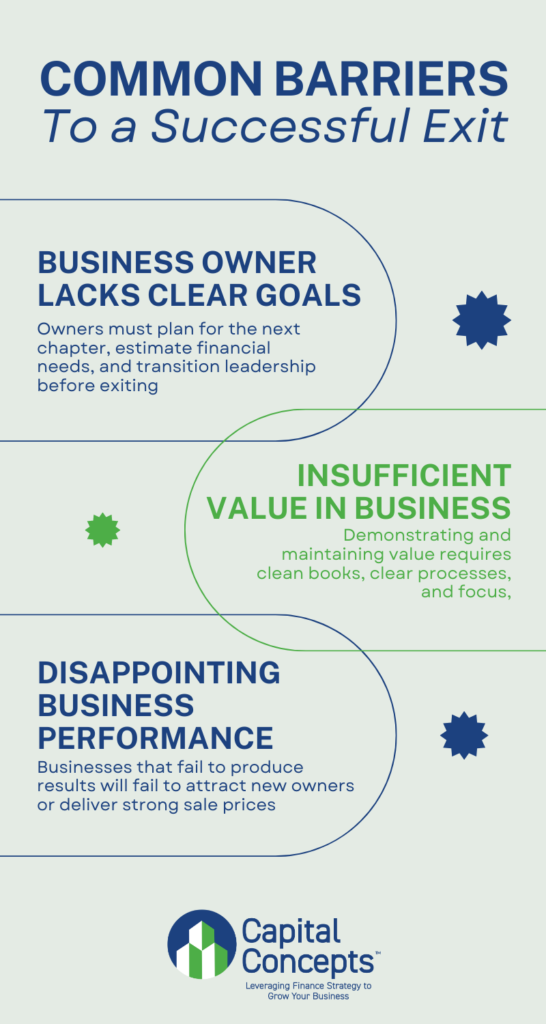Introduction To Exit Planning

We see it every day – business owners’ eyes glaze over a bit when they see anything with the words “about exit planning.” They think the idea of leaving their business sounds too far away and frankly too pie-in-the-sky to be a priority today. Who thinks about exiting when the business has so many problems right now? Conversely, why think about exiting a business when things are going well?
What if we told you that thinking about your exit in the future actually helps you solve today’s problems much more effectively? Or that looking at your business as an asset to sell helps you achieve even more success?
It’s true. Exit planning strengthens your business by solving problems, transforming it from a liability into an asset (if needed), and improving its value as an asset. Over the next few months, we’ll delve into how this works. Today, we start with the basics: What is exit planning? Why is this a smart approach to take with your business? When is the best time to start? (As you may have guessed, we’d say start today.)

What Is Exit Planning?
You may not be thinking of an exit now, but at some point in the future, you’ll either choose to exit your business, or life will force your hand. Everyone wants to leave their business with a profit – after all, that is one of the main objectives of owning a business – creating an asset with increased value that you personally realize.
Like everything worthwhile, the most profitable exit is one where your business yields a strong return on investment (ROI). Driving ROI in your business sets you up for a profitable exit – it increases its value. Planning your exit requires you to take a close look at your business, uncover and solve problems, and strengthen its performance.
You can exit your business in numerous ways, not all positive (closing or liquidating, for example). Strong exits include selling to another entity, selling to your employees, transferring ownership to a family member, and recapitalizing it, among others. All require the same planning, so we will use the general term “sell” as a synonym for any strong exit, unless it’s important to differentiate.
Why Exit Planning
To successfully leave your business one day with the resources you need for your next chapter, YOU MUST PLAN AHEAD. Your business must demonstrate value to attract a buyer and/or yield the amount you need for your next chapter. The stronger your business, the higher its value will be. Most businesses fail this test – 80% of businesses put up for sale do not sell within a year, and of the 20% that actually sell, only 14% achieve the desired sale price.
To be one of the slightly less than 3% of business owners who realize the benefits of business ownership, you must focus on building value inside your business and setting it up to thrive separately from you.
When To Start Exit Planning
How long does it take to plan a strong exit? We always start with the end in mind – the actual sale or transfer of ownership. It takes an average of 9-12 months to actually sell a business successfully (sometimes longer). Owners who decide on the spur of the moment to sell will almost certainly not receive a price that meets any of their goals.

As you do when you prepare to put a house on the market, you need time to prepare to put your business up for sale to get the best price. If you plan to transfer leadership or ownership to someone else, you must find that person, train them, and delegate your responsibilities successfully. In our experience, optimizing a business for an exit generally takes 3-5 years. Some will need more time, and there’s no such thing as starting too soon.
Barriers To a Successful Exit
What takes so long? Why do you need to allow at least 3-5 years for exit planning? The reality is that we inevitably find one or more of three main issues that you must correct before your business will sell at the price you need it to: lack of clear goals as the business owner, insufficient value in the business, and insufficient performance of the business.
While the details of each barrier vary, they are all interconnected and require committed attention to overcome. In our next article, we’ll talk about these challenges, and what you’ll need to look for as you work towards a successful exit.
What About You?
Have you ever exited a business? Have you acquired one? What are some questions you have about selling or exiting a business? We’d love to hear from you and perhaps feature your story in a future article. Contact us at Clientsuccess@CapConceptsUSA.com. We’d love to hear from you.
Related Articles
Get A Grip Roundtable
Does This Sound Familiar? Your business isn't as efficient or profitable as you'd like. You’re putting in the hours but not seeing the results you want. You’re stuck. You know your business has potential, but you're unsure how to take it to the next level. You’re...
Eight Ways to Exit Your Business
When it comes to exiting a business, most people assume there is only one way out: sale. But actually, there are 8 distinct ways to exit a business. Before considering your next move, it’s crucial that you understand each of these options to determine which is best...
The Formula for an Effective Exit Plan
Ask a business owner over the age of 50 when they plan to transition or exit their business, and you’ll get one of two answers:
– a blank stare, or
– “I’ll work another 5-10 years and call it quits.”(And if you ask this person again in another 5-10 years, you’ll likely get the same answer!)
The bottom line is the same – most business owners lack a plan for leaving their business. Read the article to learn what goes into an exit plan.
